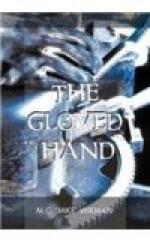“It is a purely chemical compound,” Sylvester explained. “There is no blood in it, nor any other animal matter.”
This was repeated to Mahbub, and, after some further hesitation, he advanced to the table.
A moment later, Sylvester was bending above the prints. Then he looked up, his face red with astonishment, and motioned me to approach.
“Look at that!” he said, and laid the prints before me.
My heart was leaping with the hope that the incredible had happened; that here lay the clue to the mystery. But the first glance told me that such was not the case. The prints resembled Swain’s not at all. And then, when I looked at them again, I perceived that they resembled no other prints which I had ever seen.
For the prints of all ten fingers were exactly alike, and consisted, not of whorls and spirals, but of straight lines running right across the finger. Sylvester was staring at them in bewilderment.
“These,” he said, when he could find his voice, “are the most remarkable prints I ever saw.”
“Do they resemble those on the robe?” asked the coroner.
“Not in the least.”
“Then that settles that point,” said Goldberger, with what seemed to me a sigh of relief.
“There is one thing, though,” said Sylvester, eyeing Mahbub curiously; “I wish I knew the secret of these extraordinary prints.”
“I can tell it to you,” said Silva, with a little smile. “It is not at all extraordinary. The system of finger-print identification has been in use among the Hindus for many centuries, and was adopted by the English courts in India nearly a hundred years ago, after every other method had failed. The caste of Thuggee, which was at war with all other castes, and especially at war with the English, evaded it by stimulating on the fingers of their male children the formation of these artificial ridges. It became a sacred rite, performed by the priests, and has been maintained by the more devout members of the caste, although the need for it has ceased.”
Sylvester looked at the prints again.
“I should like to keep these,” he said. “They would be a great addition to my collection.”
Silva bowed.
“Mahbub will have no objection,” he said. “To him, they are of no importance, since there are many hundreds of men in the world with finger-tips identical with his. That is all?”
Goldberger nodded, and the two strange figures walked slowly away toward the house.
CHAPTER XVI
MISS VAUGHAN’S STORY
Sylvester was still bending in ecstasy over those strange finger-prints—the absorbed ecstasy of the collector who has come unexpectedly upon a specimen wonderful and precious.
“Well,” he said, looking up, at last, “I’ve learned something new to-day. These prints shall have the place of honour. They might not be a means of identification among the Thugs, but I’ll wager there’s no collection in America has a set like them! They’re unique!”




